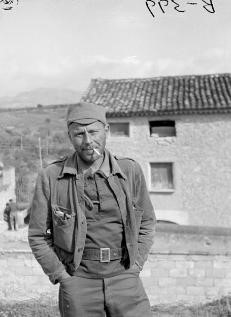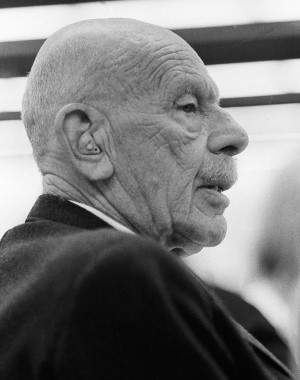
Biography
Bessie, Alvah (Bessie, Cecil Alvah); b. August (June) 4, 1904, NYC; Graduated from Columbia University; Divorced; Writer and Actor; CP April (May) 1936; Received Passport# 493411 on January 7, 1937 which listed his address as 164 Lexington Avenue, NYC; Sailed January 22, 1938 aboard the Lafayette; Arrived in Spain via Agullana on February 3, 1938; Trained with the Tarazona, Recruit Co. 1; Served with the XV BDE, Lincoln-Washington BN, Adjutant Co. 2 and Co. 4.; Last unit XV BDE Estado Mayor as the editor of the Volunteer for Liberty; Rank Cabo; Returned to the US on December 15, 1938 aboard the Paris; WWII Civil Air Patrol, Lieutenant and Screen Writer in Hollywood; One of the “Hollywood 10” who appeared before the House Un-American Activities Committee (HUAC) in 1947, imprisoned for a year in Texarkana Prison, was blacklisted in Hollywood; d. July 21, 1985, Terra Linda, Marin County, California; His body was donated to medical science to University of California at Berkely Medical School.Source: Sail; Scope of Soviet Activity; Figueres List; Inventory North Americans; Pay; RGASPI; ALBA 024 Alvah C. Bessie Papers; Good Fight C; Harriman; Memoirs Men in Battle and Return to Spain; L-W Tree Ancestry, Find-a-Grave#13576531. Code A
Biography Alvah Bessie was born in New York City on June 4, 1904 to Daniel Nathan Cohen Bessie, a successful businessman and inventor, and Adeline Schlesinger. The younger of two boys, Bessie was raised in ease in the then-prosperous precincts of Harlem. He attended public school, graduated from Dewitt Clinton High School and, in 1920, enrolled in Columbia University. Bessie's rebellious nature often placed him at odds with his father's conservative values and authoritarian manner. When, in 1922, Daniel Bessie died after suffering a severe economic setback, he left his family in a precarious financial state, but Alvah Bessie free to pursue his own ambitions. Bessie completed his degree and graduated from Columbia in 1924 with a B.A. in English. Through a friend, he found work as an actor with Eugene O'Neill's Provincetown Players. For the next four years Bessie immersed himself in the New York theater scene, performing with the Provincetown Players, the Theater Guild and with actor-manager Walter Hampden's repertory company in a production of Cyrano de Bergerac. Recognizing his limited talent as an actor, he left the theater and, in 1928, traveled to France to join the community of American expatriates in Paris intent on becoming a writer. During his brief stay in France, he worked as a rewrite man at the Paris-Times, and wrote "Redbird," his first short story to receive publication. He returned to New York in 1929, and for the next six years, his stories, essays, and reviews appeared in The New Republic, Scribner's, Atlantic Monthly, Saturday Review of Literature, Collier's and Story. In July 1930, he married Mary Burnett, a puppet-maker and artist. The couple moved to Vermont and had two boys -- Daniel and David. Bessie began work on his first novel, Dwell in the Wilderness. During this time, Bessie also began to study Marxist theory and question his political convictions. Bessie was awarded a Guggenheim Fellowship following the publication of his novel in 1935, and, with his family, returned to New York. Back in the City, Bessie began to move in more radical circles, and in 1936 he became a member of the Communist Party. In 1935 he joined the staff of the Brooklyn Daily Eagle, serving as drama and book editor. His tenure at the paper was marked by dissent. His radical stance on striking maritime workers in 1936 and on the Spanish Civil War ran counter to management's more conservative views. A final dispute with the paper stemmed from his praise of French novelist and aviator Andre Malraux's efforts to organize a squadron of French flyers to aid the Spanish Republic. In 1937 he resigned from the Eagle and went to work in the public relations office of the Spanish Information Bureau, a New York agency of the Republican Government. During this period, the Bessies' marriage began to flounder. The couple separated and soon after divorced. On January 22, 1938, Bessie sailed to Spain on the S.S. Lafayette to join the International Brigade's fight against the Franco-led rebellion. Although he earned his pilot's license before leaving for Spain with the objective of serving as a flyer, he was assigned to a front-line combat unit with the Abraham Lincoln Battalion, participating in the Ebro offensive from July to September 1938, and attaining the rank of sergeant-adjutant. He also served as a correspondent for the International Brigade's publication, The Volunteer for Liberty. He daily chronicled his personal experiences in a series of notebooks, and upon his return to the United States, these jottings became the basis of his wartime memoirs, Men in Battle(1939). From 1939 to 1943, Bessie was film and theatre critic for the New Masses, and, under a pseudonym, wrote a regular column for a Young Communist League publication. He remained active in the Spanish Republican cause, working on behalf of the Joint Anti-Fascist Refugee Committee writing articles and delivering speeches. He started writing screenplays and moved to California in 1943 when Warner Brothers studios hired him as a contract writer. During World War II, he served as Second Lieutenant in the Civil Air Patrol, Los Angeles Squadron 3. In 1945 his original story that was the basis for the screenplay of "Objective Burma" was nominated for an Academy Award. His other screen credits from this time include, "Hotel Berlin," "The Very Thought of You," "Northern Pursuit, " and "Smart Woman." He was fired from Warner Brothers in 1945 in the wake of his outspoken support of striking studio workers. In September 1947, the House Un-American Activities Committee (HUAC) launched an investigation on the influence of the Communist Party in the motion-picture industry. Over fifty people were called to testify and answer questions regarding political affiliations and associations. Bessie, along with nine other Hollywood figures, refused to comply with the Committee's demands. They were cited for contempt of Congress, given one-year prison sentences, and became known as the "Hollywood Ten." Bessie served out his term in a federal correctional facility in Texarkana, Texas and was blacklisted in Hollywood. After his release from prison, Bessie relocated to San Francisco and found employment with the International Longshoremen's and Warehouseman's Union as editor of The Dispatcher, the union newspaper. In 1951 he edited, The Heart of Spain, an anthology of writings on the Spanish Civil War published and distributed by the Veterans of the Abraham Lincoln Brigade. Throughout the 60s and 70s, Bessie worked as a publicist for San Francisco arts organizations including the San Francisco Mime Troupe and the San Francisco Film Festival. He also worked as stage manager and lighting technician for the Hungry I nightclub, an experience that inspired the novel, One for My Baby (1980). He married Sylviane Muller in 1963. (Muller was his third wife; his second marriage, to Helen Clare Nelson, ended in divorce). In 1968, Bessie collaborated on the Spanish film, Espana otra vez, and offered an account of the production and his return to Spain in his memoir Spain Again. He remained active in the Bay Area Chapter of the Veterans of the Abraham Lincoln Brigade, and in 1975, he was honored at the 39th Anniversary Dinner. Before he could complete work on Our Fight, a VALB anthology devoted to the writings of Lincoln Brigade veterans, Bessie died of a heart attack on July 21, 1985. He was 81 years old.- Courtesy of Tamiment Library, NYU.
Alvah Bessie interview, August 5, 1980, John Gerassi Oral History Collection; ALBA.AUDIO.018; box number 1; folder number 18-023; Tamiment Library/Robert F. Wagner Labor Archives, New York University.
Photograph: Alvah Bessie, Lincoln-Washington activist, April 1938. The 15th International Brigade Photographic Unit Photograph Collection; ALBA Photo 11; ALBA Photo number 11-0176. Tamiment Library/Robert F. Wagner Labor Archives. Elmer Holmes Bobst Library, 70 Washington Square South, New York, NY 10012, New York University Libraries.; Alvah Bessie, 1985, by Richard Bermack.
